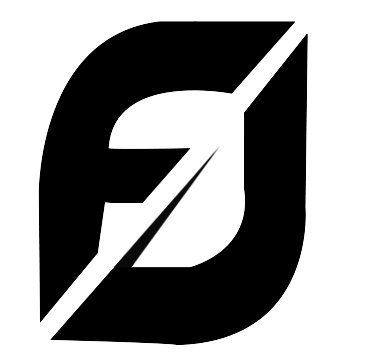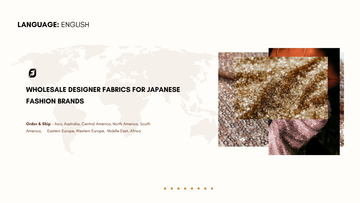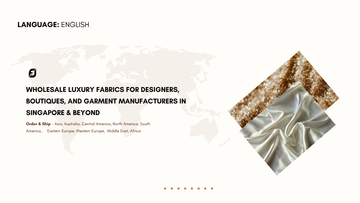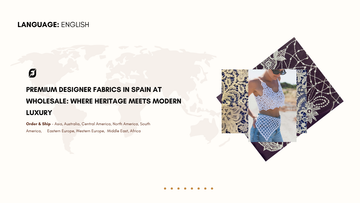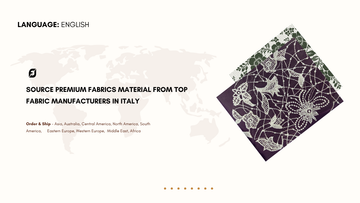In Japan, fashion is more than clothing—it’s culture, art, and tradition woven together. From the bustling streets of Harajuku to the luxury boutiques of Ginza, every outfit tells a story. Behind each creation, premium fabric sets the stage. Japanese designers and fashion brands are increasingly looking for wholesale fabrics that combine quality, creativity, and precision, whether for modern streetwear, bridal couture, or traditional kimono-inspired collections.
This guide explores the world of designer fabrics available for wholesale in Japan, helping fashion brands, boutiques, and apparel manufacturers source the perfect materials to bring their designs to life.
Understanding the Japanese Fashion Fabric Market
Japanese buyers approach fabric sourcing with a high level of precision and quality awareness. Key insights:
-
Quality obsession: Japan has zero tolerance for defects, emphasizing flawless embroidery, color accuracy, and consistency in prints.
-
Cultural integration: Traditional clothing like kimono and yukata inspire modern fashion collections, creating demand for silks, jacquards, and hand-embroidered fabrics.
-
Trendy districts: Harajuku favors bold prints and streetwear textures, Ginza prefers luxury fabrics, and Shibuya leans toward smart textiles for urban fashion.
-
Seasonal precision: Designers often plan collections around cherry blossom season in spring and autumn foliage in fall, requiring specific color palettes and motifs.
-
Technical innovation: Smart textiles and performance fabrics are increasingly used in urban and functional fashion lines.
Popular Fabric Types in Demand
Japanese fashion buyers search for a wide variety of fabrics. Here’s a detailed breakdown:
1. Embroidered Fabrics
-
Ideal for bridal, evening, and premium casual collections.
-
Japanese buyers value fine threadwork, floral patterns, and subtle metallic accents.
-
Example: Fabricdiary’s embroidered chiffon and organza – perfect for luxury dresses.
2. Printed Fabrics
-
Streetwear and seasonal collections often use floral, geometric, and abstract prints.
-
Popular for kimono-inspired casual tops and dresses.
-
Example: Digital printed silk, rayon, and cotton blends.
3. Plain Fabrics
-
Foundation fabrics for layering, tailoring, and mix-and-match collections.
-
Includes RFD cotton, silk, viscose, and satin.
-
Favored by designers for creating high-quality structured garments.
4. Specialty Fabrics
-
Beads, sequins, lace, mirror work, threadwork, floral textures.
-
Used for bridal gowns, evening wear, and festival collections.
-
Example: Fabricdiary’s small-quantity sequin fabrics allow Japanese designers to sample before bulk orders.
Buying & Sourcing Tips for Japanese Fashion Brands
-
Start with small samples:
-
Fabricdiary allows small quantity orders, helping designers test quality, color, and drape.
-
-
Bulk sourcing for scaling:
-
Madhav Fashion factory offers factory visits and bulk orders for production.
-
-
Use B2B platforms for reference:
-
Alibaba, IndiaMart, TradeIndia, and Etsy showcase supplier reviews, product images, and verified certifications.
-
-
Check compatibility with local trends:
-
Understand seasonal palettes, fabric textures, and garment styles that resonate with Japanese consumers.
-
-
Technical checks:
-
Ensure fabrics meet care requirements, shrinkage standards, and wash durability, crucial for Japanese buyers.
-
Seasonal & Occasion-Based Fabrics
Japanese fashion is seasonally driven:
| Season/Occasion | Popular Fabrics | Typical Use |
|---|---|---|
| Spring (Cherry Blossom) | Pastel printed silk, chiffon, organza | Spring collections, casual wear, festival outfits |
| Summer | Lightweight cottons, breathable linen | Streetwear, daily wear |
| Autumn (Autumn Leaves) | Warm-tone jacquards, embroidered velvet | Premium fashion, bridal, boutique collections |
| Winter | Wool blends, satin, heavy lace | Evening wear, luxury layers, formal events |
| Weddings & Parties | Sequins, beads, lace, mirrorwork | Bridal gowns, party dresses, evening wear |
Japanese buyers value fabrics that align with season, occasion, and cultural aesthetics, ensuring higher engagement and sales.
Technical & Smart Fabrics
Modern Japanese fashion brands increasingly prefer function-driven textiles:
-
Moisture-wicking and stretch fabrics for urban streetwear and active fashion
-
RFD and pre-colored fabrics to save production time and ensure color consistency
-
Fabrics with stain resistance or heat control for comfort and durability
These innovations are especially critical for boutique brands and premium designers seeking a competitive edge.
Inspiration
Many Japanese designers share how premium Indian fabrics transformed their collections:
-
“Using Madhav Fashion’s embroidered organza allowed our bridal line in Tokyo to stand out during the exhibition. The quality and precision were unmatched.” – Boutique Owner, Ginza
-
“Fabricdiary’s small-quantity printed silk enabled us to experiment with seasonal trends without committing to bulk, reducing risk and cost.” – Designer, Harajuku
-
“The ready-for-dye fabrics were ideal for our eco-conscious collection. Perfect color consistency and texture.” – Apparel Brand, Osaka
These examples demonstrate how sourcing high-quality fabrics empowers Japanese brands to create inspiring collections.
Why Fabricdiary & Madhav Fashion Are Trusted
-
Flexibility: Small orders via Fabricdiary; bulk via Madhav Fashion factory visits
-
Premium quality: Zero defect tolerance, color consistency, precise embroidery
-
Variety: Embroidered, printed, plain, lace, beads, sequins, mirrorwork, floral, bridal, evening wear fabrics
-
Global reliability: Trusted by brands worldwide; B2B platform presence and verified references
Japanese designers can confidently experiment, innovate, and scale their collections knowing they have reliable sourcing partners.
Inspire Action
Fashion in Japan demands precision, creativity, and elegance. From traditional kimono-inspired collections to urban streetwear, the right fabric is the foundation of every masterpiece.
By sourcing premium designer fabrics from Fabricdiary and Madhav Fashion, Japanese fashion brands can:
-
Experiment with small quantities
-
Scale confidently with bulk orders
-
Access luxury fabrics suitable for every occasion
-
Stay ahead of seasonal and cultural trends
Start exploring today and discover wholesale designer fabrics that inspire, innovate, and elevate Japanese fashion.
_______________________
FAQ
Can I order small quantities of premium fabrics for testing?
Yes, Fabricdiary allows small quantity orders so Japanese designers can sample fabrics before bulk buying.
What types of fabrics are popular among Japanese fashion brands?
Embroidered fabrics, printed silk, cotton blends, plain fabrics, lace, beads, sequins, and mirrorwork are highly preferred.
Can I source fabrics for bridal and evening wear collections?
Absolutely. Madhav Fashion and Fabricdiary offer luxury fabrics suitable for weddings, parties, and formal events.
How can I ensure fabric quality before buying in bulk?
Order samples via Fabricdiary and visit Madhav Fashion factory for bulk inspection if needed.
Are the fabrics suitable for seasonal collections?
Yes, fabrics are available in seasonal colors, textures, and patterns, aligned with Japanese fashion trends like cherry blossom spring and autumn leaf collections.
Can I customize fabrics or colors?
Yes, RFD fabrics and custom orders are available to meet specific design and color requirements.
Are these fabrics sustainable or ready-for-dye?
Many fabrics are RFD and eco-conscious, helping brands maintain sustainability standards.
